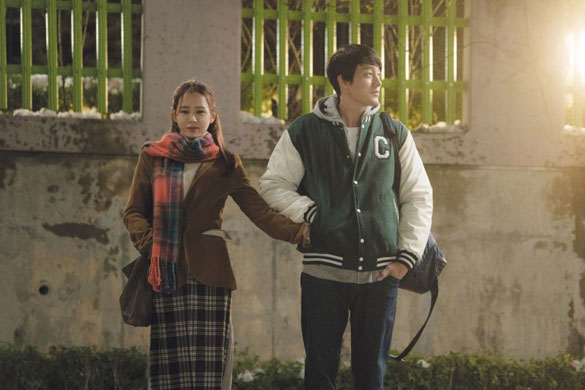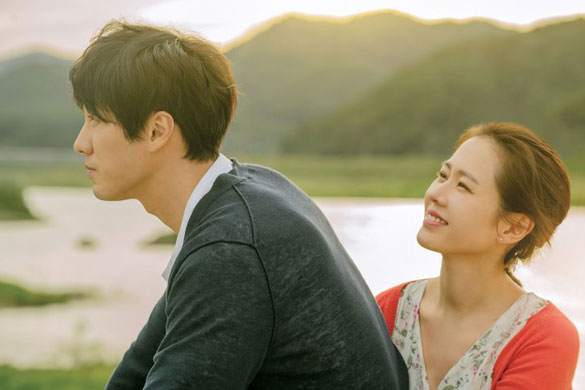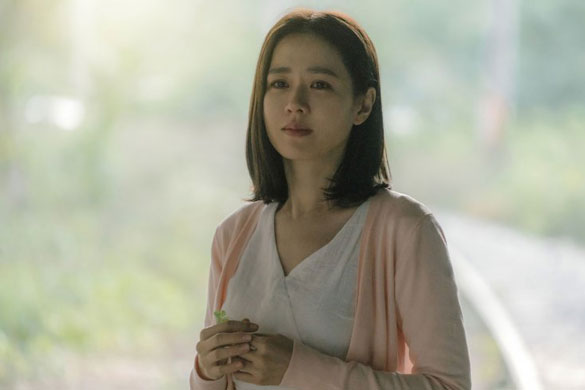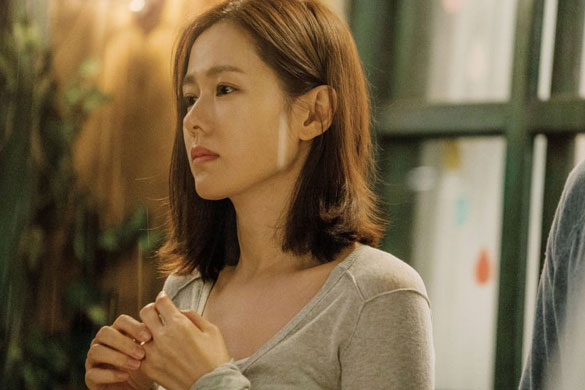"Make sure to look after Ji-ho for a long time, and when you feel you've become a burden to him come and meet me in Cloudland.
I'll save you a seat next to me..."
Synopsis:
Woo-jin (So Ji-sub) has raised his young son Ji-ho (Kim Ji-hwan) alone since his wife, Soo-ah (Son Ye-jin), passed away at just 32 years of age. Prior to her passing, Soo-ah promised Ji-ho that in the rainy season she'd return to him, and though Woo-jin 'knows' his wife was simply trying to ease her son's pain over her impending death, Ji-ho is absolutely adamant that she was telling the truth.
As the rains begin to fall a year after Soo-ah's death, Ji-ho straight away runs off at breakneck speed towards an old railway line with his father somewhat reluctantly in tow and, to Woo-jin's absolute amazement, at the end of a short tunnel they do indeed find Soo-ah sitting on the ground beside the railway tracks; dazed and confused, but alive at least.
However, she has no idea of how she got there and no memory whatsoever of her family life...
Review:
What comes to your mind when you hear the name Son Ye-jin? Do you instantly think of her starring roles in numerous big budget blockbusters, such as The Pirates, The Tower, Chilling Romance, Blood and Ties and The Last Princess; do you consider the well thought of work she's done with first time directors in films including White Night and The Truth Beneath; does your focus point to comedies like My Wife Got Married or The Art of Seduction that while humorous spoke of the changing place of women in Korean society; or do you think more immediately of TV series such as Personal Taste, Shark, and the seminal Alone in Love that showed her to be a star as important to the small screen as the big screen? While each and every one of these sides to Son Ye-jin’s illustrious career are wholly and entirely valid areas of focus, fans of films from the New Korean Cinema wave of the late 90s and early 2000s are more likely to look to far earlier in her filmography to cite any one of her appearances in films of a specific genre that not only played a significant part in shaping New Korean Cinema as a whole but also resulted in her being catapulted to mega-stardom in the first place. That genre was, and is, of course melodrama.
Throughout the early 2000s, from virtually the outset of her acting career, Son Ye-jin's critically acclaimed appearances in numerous NKC films with overt melodramatic tones - from Lovers' Concerto, to The Classic, to Crazy First Love, to A Moment to Remember, to April Snow - cemented her place as the 'Queen of Melodrama' of the entire New Korean Cinema wave. Indeed, her nuanced, impassioned and often genuinely heart-breaking performances in each and every one both quickly catapulted her to stardom and, symbiotically, saw many of her films soon deemed to be utter classics and even be considered to virtually define New Korean Cinema melodrama; underlining the genre's importance to Korean cinema as a whole and likewise Son Ye-jin's importance to the genre. In the years since the New Korean Cinema wave, Son Ye-jin's career and stardom has of course gone stratospheric, touching every genre and size of film you care to mention, but so seminal was her early work in melodrama that the news that she was stepping back into that specific genre with a role in romantic fantasy drama Be With You had me for one virtually salivating in the hope that the film would ultimately turn out to be a modern-day The Classic, A Moment to Remember, or indeed April Snow, and show Son Ye-jin doing what she frankly does better than anyone; that is, genuinely breaking viewers’ hearts with each and every tear she sheds.
 |
Be With You begins with a short animated story telling the tale of a mother penguin keeping an eye on her young child from Cloudland. As the rainy season commences, she returns to the world spending a happy, joyous time with her family until the rains end, when Cloudland beckons once again. As animation shifts to live action, we learn that the story is actually detailed in a book made for Ji-ho by his mother before her death, and as we later discover, was the way in which she explained how she herself would return.
The early stages of the narrative nicely set up the character demographic; gently showing the difficulties both Woo-jin and Ji-ho still have in accepting the loss of Soo-ah a year after her passing, in spite of the bond they clearly have for each other and the fact that they each have the other's back without limit or hesitation. This section of Be With You, prior to Soo-ah's return, also features a fair amount of genuinely funny humour, mostly relating to Woo-jin’s best friend Hong-goo (Ko Chang-seok) and his efforts to get Woo-jin interested in a certain, somewhat mysterious ‘lady of class’ (played by Gong Hyo-jin). I first saw Be With You at a London Korean Film Festival teaser screening and the range of giggles to hearty laughter coming from the audience in this section shows without question how successful these early light-hearted moments truly are. Those who are perhaps less familiar with classic New Korean Cinema wave melodramas may initially find such humour in a film that deals with death and ultimately details heartbreak a little odd, but the combination of Love, Loss and Laughter in singular Korean films was so extensive throughout the New Korean Cinema wave of the late 90s and early 2000s and beyond that humour in the early stages of Korean melodramas for a time almost became a ‘must have’ (more on Love, Loss and Laughter in Korean cinema at the conclusion of this review/essay) and as such Be With You feels classic from the very outset. If you consider the classic NKC melodramas of Son Ye-jin referenced above, you'll find this idea appearing on numerous occasions – from Crazy First Love to Lovers’ Concerto and beyond – and though their humour may not be as overt as that found in Be With You, they are each connected by it, nonetheless.
After Soo-ah’s mysterious return, Be With You becomes the romance you would hope it would be (ticking the ‘Love' checkbox in the Love, Loss and Laughter in Korean cinema trope). The gentle building of Woo-jin and Soo-ah's feelings for each other (for the first time, from Soo-ah’s perspective since she can't remember anything prior to her reappearance) is juxtaposed with flashbacks to Woo-jin’s frankly inept efforts to get Soo-ah's attention in their youth and subsequently the start of their relationship initially. Here too, there are beautifully humorous moments that make those efforts wholly believable and entirely natural; bolstered greatly by a noticeable chemistry between Son Ye-jin and So Ji-sub.
Of course loss plays a huge part in any melodramatic tale, and in the case of Be With You new loss amplifies old loss to a deeply poignant level. Touching and moving the 'main' narrative conclusion is, without question, but that certainly isn't the whole story. One would be forgiven for assuming Be With You would conclude at the end of the rainy season (fear of spoilers prevent me from being less vague) and personally on a first viewing at that point in the tale I was happy to, for a moment, think that would indeed be the case. However, the story in fact continues, detailing Woo-jin’s discovery of a diary written by Soo-ah seven years prior to her death. These final scenes (again featuring flashbacks) redefine almost entirely everything we know about the couple's relationship, adding an emotional depth easily equal to if not greater than anything we've seen thus far. Not only that, but the explanation in depth of the otherworldly reason for Soo-ah’s return ramps up the poignancy yet further, coming across as heart-breaking, uplifting and life-affirming at once and (ever so quietly) asking if the choices you make would differ if you knew they'd end in tragedy.
 |
Over the years, the popularity of Korean film melodramas has somewhat waxed and waned, but so seminal were – and still are – the classic, most famous NKC examples of the genre that modern day releases are as likely as not to contain hugely (classically) popular tropes that could be said to reference, link or point to the genre’s entire lineage, allowing newer melodramas to stand alongside the classics in both nature and worthiness. Be With You fits in with the idea of these classic Korean melodrama tropes in not one, not two, but three distinct ways, ensuring that though the film story is based on a Japanese novel of the same name (and while some of these classic tropes are not exclusive to Korea), it still feels wholly Korean and indeed classically so:
Firstly, back in the day, as it were, the range of Korean melodramas featuring terminal or critical illness was so extensive that the inclusion of such tropes was for a time almost de rigueur, in a similar manner that the inclusion of long-haired, pale-faced female ghosts was almost expected in Korean horror. Even if you were only to consider Son Ye-jin's films, April Snow; A Moment to Remember; Lovers’ Concerto and Crazy First Love all feature terminal or critical illness prominently. As such, Be With You focusing its story on a character who has died, returns and ultimately has to go back to ‘the other side’ fits wholly and completely with this trope, even if it is initially inverted.
Secondly, a hugely popular narrative and genre trend in classic Korean melodramas wasc the idea of love across time; characters separated by years somehow communicating whether by, for example, correspondence by an otherworldly means (letters delivered across the years through a mystical mailbox in Il Mare or conversations likewise via a ham radio in Ditto), or indeed a character learning of another's life and love through posthumous written correspondence defining the two characters’ relationship in the process, as seen in Failan among others. As such, Woo-jin finding Soo-ah’s diary written seven years before her death and reading entries specifically aimed at him in the present day – which (again) redefines everything Woo-jin thought about her feelings prior to their dating – frankly screams of Love Across Time and in the process classic Korean melodrama as a whole, to the nth degree and more.
Thirdly and finally, as already briefly referenced, over the years I have talked a lot about Love, Loss and Laughter in Korean cinema; the deft merging of seemingly disparate genres within singular films that played a huge part in defining classic Korean cinema internationally and pointing to an originality that ultimately allowed NKC to make massive strides on the world stage, at almost breakneck speed. I hardly even need to say it, but the sweet, gentle humour found in the early stages of Be With You (as well as Woo-jin’s faltering efforts to get close to Soo-ah in flashback); the deep, meant-to-be love they build in the past and again in the present on Soo-ah's return; and the utter heartbreak each of the main characters has to endure, twice over, all combine to allow Be With You to stand as almost a poster film for Love, Loss and Laughter in Korean cinema now and through the years. Ultimately, while some might say that no new Korean film release could be considered classic until time deems it so in hindsight, Be With You has all the markers required for it to easily stand shoulder to shoulder with almost any seminal Korean film melodrama you care to mention, including those of its star, Son Ye-jin.
 |
Summary:
Heartbreaking, uplifting and life-affirming at once, Be With You positively screams of classic Korean melodrama in spite of being based on a Japanese novel... and that's before we even consider the fact that the star of the film is New Korean Cinema’s ‘Queen of Melodrama’, Son Ye-jin.
BE WITH YOU (지금만나러갑니다 / 2018)
Director: Lee Jang-hoon
Starring: Son Ye-jin and So Ji-sub
|





